- Health Conditions A-Z
- Health & Wellness
- Nutrition
- Fitness
- Health News
- Ayurveda
- Videos
- Medicine A-Z
- Parenting
- Web Stories
Untimely Rainfall Leaves The Country Prone To These Infectious Diseases

Credits: Canva
India is no stranger to the monsoon, but in recent times, untimely rainfall, during the summers has become a recurring and worrying pattern. Sudden downpours and extended wet spells, often hitting before or after the traditional monsoon season, have created favorable conditions for a surge in seasonal diseases. Public health experts are increasingly concerned that this erratic weather is putting millions of Indians at risk, particularly in urban areas where poor drainage and sanitation aggravate the problem.
Why Untimely Rainfall Is a Health Hazard
Unseasonal rains lead to prolonged humidity and stagnant water, two ideal conditions for the breeding of disease-carrying mosquitoes and the spread of bacteria and viruses. Overflowing drains, waterlogged streets, and contaminated water supplies become hotspots for infection. With climate change making such weather more frequent, India’s already burdened healthcare system faces further pressure during the monsoon and beyond.
Here Is a List of 10 Most Common Monsoon Diseases:
Dengue
Spread by the Aedes mosquito (often called the tiger mosquito), dengue is the most widespread monsoon disease. To prevent bites, apply mosquito repellent gel or lotion regularly.
Symptoms:
- High fever
- Swollen lymph nodes
- Skin rashes
- Headache
- Low platelet count
- Hypersensitivity
Chikungunya
Caused by mosquitoes that breed in stagnant water, often in overhead tanks, coolers, or unused containers.
Symptoms:
- Intense joint pain
- High fever
- Fatigue
- Chills
Malaria
Another mosquito-borne illness that spikes during monsoon due to waterlogging.
Symptoms:
- Recurring high fever
- Chills and sweating
- Body ache
- Severe anemia
Cholera
Caused by consuming contaminated food or water, particularly where sanitation is poor.
Symptoms:
- Dehydration
- Muscle cramps
- Low blood pressure
- Rapid heartbeat
- Loss of skin elasticity
Typhoid
A highly contagious bacterial disease, often resulting from unhygienic food and water.
Symptoms:
- Prolonged high fever
- Weakness
- Abdominal pain
- Vomiting
Viral Fever
Common during monsoon, this illness spreads easily due to temperature fluctuations and humidity.
Symptoms:
- Fever
- Fatigue
- Chills
- Muscle and joint pain
- Inflammation of the throat
Diarrhea
Typically caused by unhygienic food or water, diarrhea can become dangerous if left untreated.
Symptoms:
- Watery stools
- Abdominal cramps
- Fever
- Nausea
Influenza
Fluctuating weather often leads to cold and flu symptoms, which can spread quickly.
Symptoms:
- Fever
- Muscle ache
- Headache
- Nasal congestion
- Persistent cough
Leptospirosis
Transmitted from animals to humans, this bacterial infection becomes common in waterlogged areas.
Symptoms:
- High fever
- Headache
- Red eyes
- Abdominal pain
- Rashes
Stomach Infections
Caused by the consumption of unhygienic food, leading to infections like gastroenteritis.
Symptoms:
- Nausea and vomiting
- Abdominal cramps
- Diarrhea
- Low-grade fever
Staying Safe During the Monsoon
As India grapples with climate change-induced weather patterns, it is essential to stay prepared. Avoid street food, drink only boiled or filtered water, and use mosquito repellents. Basic hygiene practices like washing hands regularly and ensuring proper sanitation can go a long way in protecting yourself and your family during this unpredictable season.
Drinking Even In Moderation Can Increase Your Cancer Risk In This Organ, Finds Study
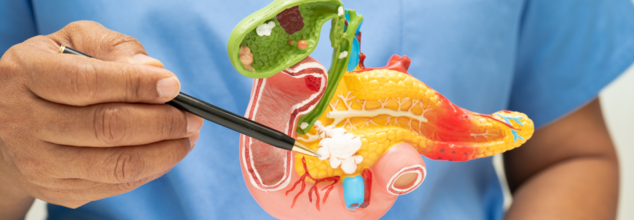
Credits: Canva
From time and again doctors have said that no amount of alcohol is good for you. Alcohol, in fact, is a carcinogen. As per the National Human Genome Research Institute, a carcinogen is a substance, organism or agent capable of causing cancer. The International Agency for Research on Cancer (IARC) also classifies alcohol as Group 1 carcinogen, which means, there is enough evidence to conclude that it causes cancers in human. The risk of cancer increases with the amount of alcohol consume, and the risk stats from the first drink.
As per a new study, it is also linked to pancreatic cancer. While for the longest, the scientific community had "limited" or "inconclusive" connection on it. However, a large study by the World Health Organization's (WHO) IARC looked at data from around 2 million people across 30 studies in four continents. This was done for over 16 years.
What Did The Study Find?
The study found a slight rise in pancreatic cancer risk linked to alcohol consumption, regardless of gender or smoking status. The increase was more pronounced in women consuming 15 grams or more of alcohol daily, and in men who drank 30 grams or more per day.
The study has been published in PLOS Medicine, and it found a modest yet consistent link between alcohol consumption and pancreatic cancer risk.
The study found that for every 10 grams of alcohol that is consumed by a person on a daily basis, which amounts to a small glass of wine, the pancreatic cancer risk increases by 3 percent.
What Does "Modest Risk" Mean?
Among women who consumed between 15 and 30 grams of alcohol per day, the risk of developing pancreatic cancer increased by 12 percent compared to those with only light intake (0.1–5 grams/day). In men, the danger climbed more steeply—those drinking 30 to 60 grams daily faced a 15 percent higher risk, while men consuming over 60 grams saw their risk surge by a striking 36 percent.
Put simply, if your daily wind-down routine involves more than the occasional drink, it may be worth thinking twice about what that glass is really costing your health.
How Does Alcohol Pave Way For Pancreatic Cancer?
Triggers Inflammation: Long-term alcohol use can irritate and inflame the pancreas, a condition known as pancreatitis. Over time, this chronic inflammation becomes a known risk factor for pancreatic cancer.
Damages Genetic Material: When alcohol breaks down in the body, it turns into acetaldehyde—a toxic compound that’s notoriously harsh on DNA. It can lead to mutations and interfere with your body’s natural ability to repair damaged cells.
Disrupts Glucose Balance: Alcohol interferes with glucose metabolism and insulin function. Since the pancreas plays a central role in both, this disruption puts it under considerable stress and may increase the likelihood of tumour development over time.
Drives Oxidative Stress: Drinking introduces oxidative stress—an unhealthy imbalance between damaging free radicals and protective antioxidants. This imbalance harms cell structures and creates an environment in which cancer can thrive.
Lowers Immune Defences: Consistent alcohol consumption weakens the immune system, making it harder for the body to detect and eliminate abnormal or potentially cancerous cells before they multiply.
That said, the study isn’t without limitations. It measured alcohol intake only once during the study period and had limited data from Asian populations. It also didn’t explore lifetime drinking patterns or compare the impacts of occasional binge drinking with regular consumption.
While pancreatic cancer ranks twelfth in global cancer incidence, it is far deadlier than its ranking suggests—contributing to roughly 5 percent of all cancer-related deaths worldwide.
Drinking Coffee Doesn't Affect Your Energy - It Changes The Way Your Brain Functions

(Credit-Canva)
Coffee has been hailed one of the best drinks to start your morning with by many people. Some even claim they can’t get their morning started without their cup of coffee. However, does it actually energize you or does it affect the way your body functions to accommodate more awake hours?
Your daily coffee might help you power through the day, but could it be keeping your brain too active at night, even while you sleep? A new study suggests that caffeine doesn't just affect your energy levels; it may also change how your brain works during sleep, especially if you're in your twenties.
Caffeine's Impact on Sleeping Brains
Researchers in Canada found that drinking caffeine before bed might keep your brain in a more active state all night. This study, published in the journal Nature Communications Biology, utilized electroencephalography (EEG) and artificial intelligence to see how caffeine changes the brain's behavior during rest.
The researchers explained that advanced statistical analysis and AI were used to identify subtle changes in neuronal activity. The results showed that caffeine made brain signals more complex, meaning the brain's activity was more dynamic and less predictable. This was especially true during the non-rapid eye movement (NREM) phase of sleep, which is really important for memory and getting your brain ready for the next day.
How Super Alert Caffeine State Affect Us
The study also found that caffeine boosted something called "criticality." The researchers explain that criticality as a state where the brain is perfectly balanced between order and chaos. In this state, the brain works at its best, processing information well, adapting quickly, learning, and making decisions easily.
But this super-alert state isn't good for sleep. While caffeine helps you focus during the day, this heightened state could mess with your rest at night. Your brain might not truly relax or recover.
What Caffeine Does to Brain Waves
To see these effects, researchers watched 40 healthy adults as they slept. Participants took either caffeine pills or fake pills before bed. The researchers discovered that caffeine increased beta brain waves, which are linked to being awake and mentally engaged. At the same time, it weakened slower brain waves like theta and alpha, which are connected to deep, restorative sleep.
These changes suggest that even when you're sleeping, your brain stays more active and less rested if you've had caffeine. Jerbi noted that this change in brain activity might explain why caffeine affects how well your brain recovers at night, potentially impacting your memory.
Why Age Matters with Caffeine
The effects of caffeine were much stronger in young adults aged 20 to 27, compared to middle-aged adults between 41 and 58. This difference might be because of adenosine receptors in the brain. Adenosine is a chemical that builds up during the day, making you feel sleepy. Caffeine blocks these receptors to keep you awake. Younger adults have more of these receptors, so caffeine has a stronger effect on them.
These adenosine receptors naturally decrease, which reduces caffeine's ability to block them and boost brain complexity. This could partly explain why caffeine had less of an effect on the middle-aged participants.
Since so many people use caffeine daily to fight tiredness, the researchers say more studies are needed to understand its long-term effects on brain health and to give personalized advice for different age groups.
More Than A Diagnosis: Cancer Survivors Share The Small Wins That Helped Them Heal
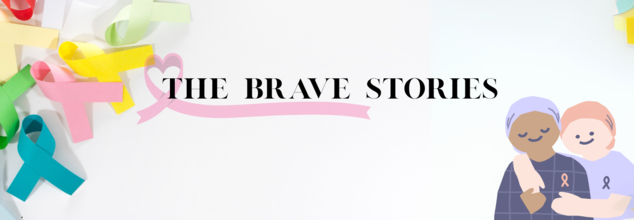
By Ishita Roy, Tanya Dutt
There’s no one way to live through cancer. For some, the diagnosis hits like a tidal wave, threatening to pull everything under. For others, it arrives quietly—unwelcome but met with remarkable composure. But for every survivor, regardless of how the disease showed up or how hard it fought, there is a story of resistance that goes far beyond hospital rooms and treatment charts.
This National Cancer Survivor Day, we look beyond the prescriptions and procedures to share stories of individuals who chose not to be defined by their illness. These are not just tales of remission or recovery—they are narratives of reclaiming joy, finding humor in the bleakest of days, and building strength in places where fear once lived.
"It Takes Time, But You Would Find Your Rhythm Again"
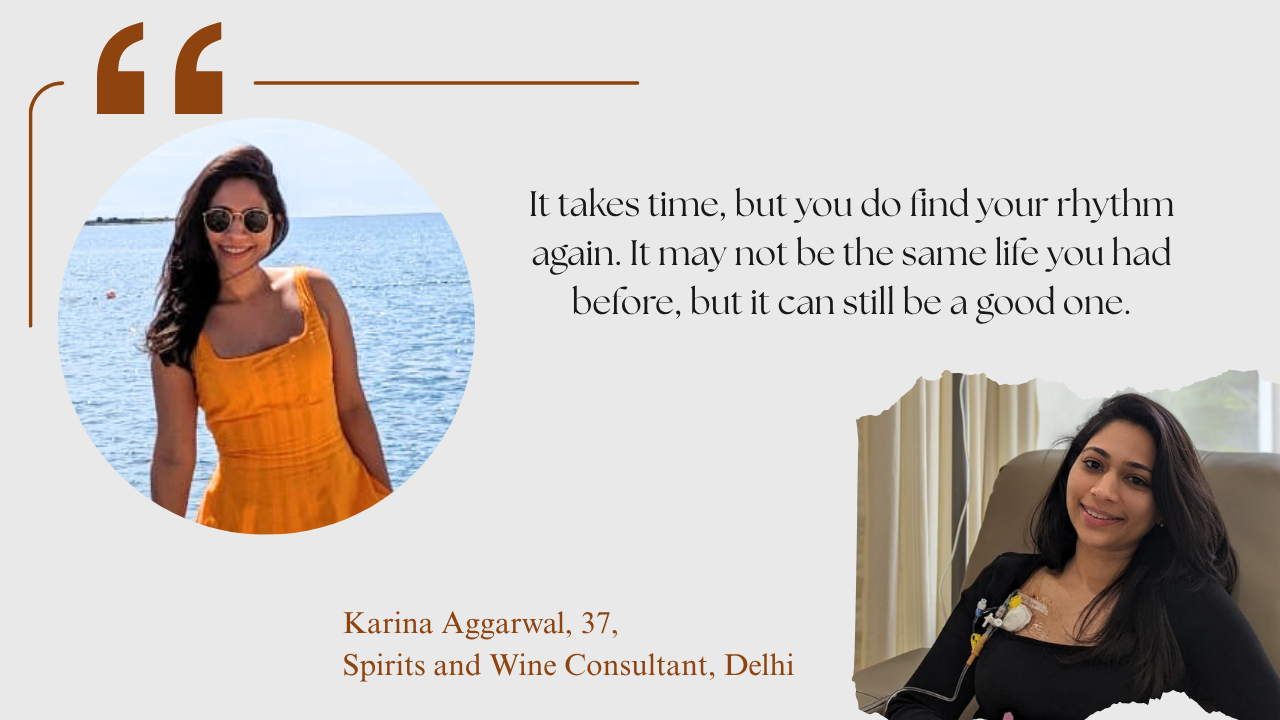
Karina Aggarwal, 37, a Delhi-based spirits and wine consultant, was diagnosed with stage 2 hormone-positive breast cancer in March 2023. Her life since then has been shaped by chemotherapy, targeted therapy, surgery—and in all these that has stayed constant in her resilience.
She’s currently on medication for three more years and regular medical check-ups are non-negotiable. “You have to be a lot more disciplined about your health than before. You learn to listen to your body and not take anything for granted,” she says.
Cancer—and especially its treatment—brought a wave of physical and emotional challenges. Chemotherapy led to joint pain, fatigue, and what’s commonly known as “chemo brain.” But from there too she found her way for what helped her beat the "chemo brain". “I had plans to catch up on reading, but I couldn’t focus. My sleep was erratic. Instead, I turned to jigsaw puzzles—they helped me focus and brought a sense of calm.”
Sharing her experience online turned into an unexpectedly healing act. She has been vocal about her journey on her Instagram @gigglewater411, which has over 34K followers. Most of her cancer journey is documented under her highlight titled 'Cancer Circus'.
“I didn’t want people to hear about it from others. I wanted to own the narrative. The love and support I received was overwhelming—people shared memories, messaged me with their stories, or simply told me they were praying for me. It gave me so much strength.”
Cancer is not the same for everyone. The symptoms vary, for Karina, she experienced loss of smell and taste. Working with food and drink, losing her sense of taste and smell hit particularly hard. “Everything burned my tongue or made me nauseous. Food, which is a big part of my life and work, was no longer enjoyable. That, and losing my hair, were really painful to deal with.”
Despite knowing it was coming, hair loss shook her. “Even with all the preparation, nothing really prepares you for the emotional toll—your face swollen from meds, no eyebrows or lashes, constant exhaustion and pain.” Yet, support from her loved ones made a difference. Friends visited between chemo cycles, timing their trips to when her energy levels were likely to be higher. For her, this kept her going.
To stay motivated, she set small goals—finishing a project, planning a short getaway. “I did my surgery first and then took a planned trip before starting chemo. I needed that break to feel like myself for a bit.”
She underwent six rounds of chemo over four and a half months, followed by over a year of targeted therapy. “The treatment weakens you over time. The pain becomes constant and hard to explain. It’s isolating. Even with family and friends around, unless someone has been through it, it’s hard to really understand.”
Thanks to her sharing her own cancer journey on Instagram, she eventually found solace in cancer support communities on the same platform. “I started connecting with others who had been through this. It’s strangely comforting to be understood without having to explain every detail.”
This is her second year in cancer remission, and looking back, she says, “It takes time, but you do find your rhythm again. It may not be the same life you had before, but it can still be a good one.”
"Doing Things I Normally Would Is What Helped Me Heal"
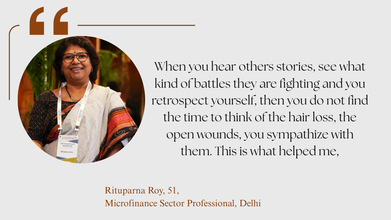
"A young girl and a mother of a 16-year-old are two different women, so it's likely that their bodies react differently to medicines. No cancer journey is the same," says 51-year-old Rituparna Roy, a Delhi-based Microfinance Sector professional, who was diagnosed with breast cancer in 2016.
It was a lump that she first felt in the left side of her breast, but did not think would be serious enough to consult a doctor. It was then when she also faced breathing issues that she spoke to her sister in law who was working as a Medical Officer at Rajiv Gandhi Hospital. However, she still let it pass.
"I could feel the something like a pimple, but I could not locate its mouth," she explained. This is when she went to a local gynaecologist and was suggested to get an ultrasound done and then consult a surgeon. "You absolutely should not go to a surgeon when you have a lump. People are often misguided. They are sent here and there. You should always go and consult an oncologist first, but most of us don't know that until it is too late," she laments.
Roy was then suggested to get a fine needle aspiration cytology (FNAC) done, which is done using a needle and syringe that extracts the fluid from the lump. The fluid is then sent for tests to rule out its cancerous condition. "My reports were delayed and this panicked my husband. When he called the hospital, he was told to pick the report in person and speak to the doctor," she recalls.
While till now there was no news for it being cancerous, however, this "hush-hush" behaviour did raise suspicion. On meeting the doctor she was told that she had breast cancer.
Then continued a long period of treatment. She immediately had her surgery and chemotherapy and after a 21-day-gap she was prescribed her second round of chemotherapy, followed by radiation. However, like in many cases have we seen historically, in medical science, many have excluded women from pain studies, assuming they can either bear more pain or that their hormonal changes can lead to more variability. This bias is still here, and was something Roy also faced when she complained of her excruciating pain during her chemotherapy. "When I complained, the doctor told me, 'you are a cancer patient, you should be able to bear this kind of pain.'"
However, it was not the regular kind of pain one would expect during a chemotherapy session. It was later detected that chemotherapy drugs which was supposed to be mixed in her bloodstreams were actually being sent to her muscles. This caused infection in her right breast due to the open wound, while she already had a mastectomy in her left breast.
This is when she was shifted to Max Super Speciality Hospital in Patparganj for her treatment. During this time, it was her caregivers, she said, who supported her the most. In Max, she was also able to get in touch with a support group of doctors and other cancer patients, which helped her get comfortable with herself. "When you hear others stories, see what kind of battles they are fighting and you retrospect yourself, then you do not find the time to think of the hair loss, the open wounds, you sympathize with them. This is what helped me," she says.
She also conducted many awareness programs in educational institutions through her support group. Talking about her cancer journey helped her heal too. What really worked out best for Roy was returning back to her usual life.
"My doctor told me to live a normal life. I was recommended to drink a lot of juice, other than that I had no restrictions in food, as long as I had home cooked food. For me, knowing that I could have a bowl of noodles with my son at home made me happy. Doing things I normally would is what helped me heal," she said.
While she acknowledges that everyone's journey and battle is different when it comes to cancer, or any ailment, she does have one mantra she holds close to and hopes that it will help those who are struggling. "Take one day at a time, whatever comes to you, take it with grace. Put yourself in hands of doctors, listen to them, but always keep your eyes and ears open. Remember, you know your body better than anyone else!"
"I Talked About It To Everyone I Knew, Their Good Wishes Helped Me In More Ways Than I Can Think Of"
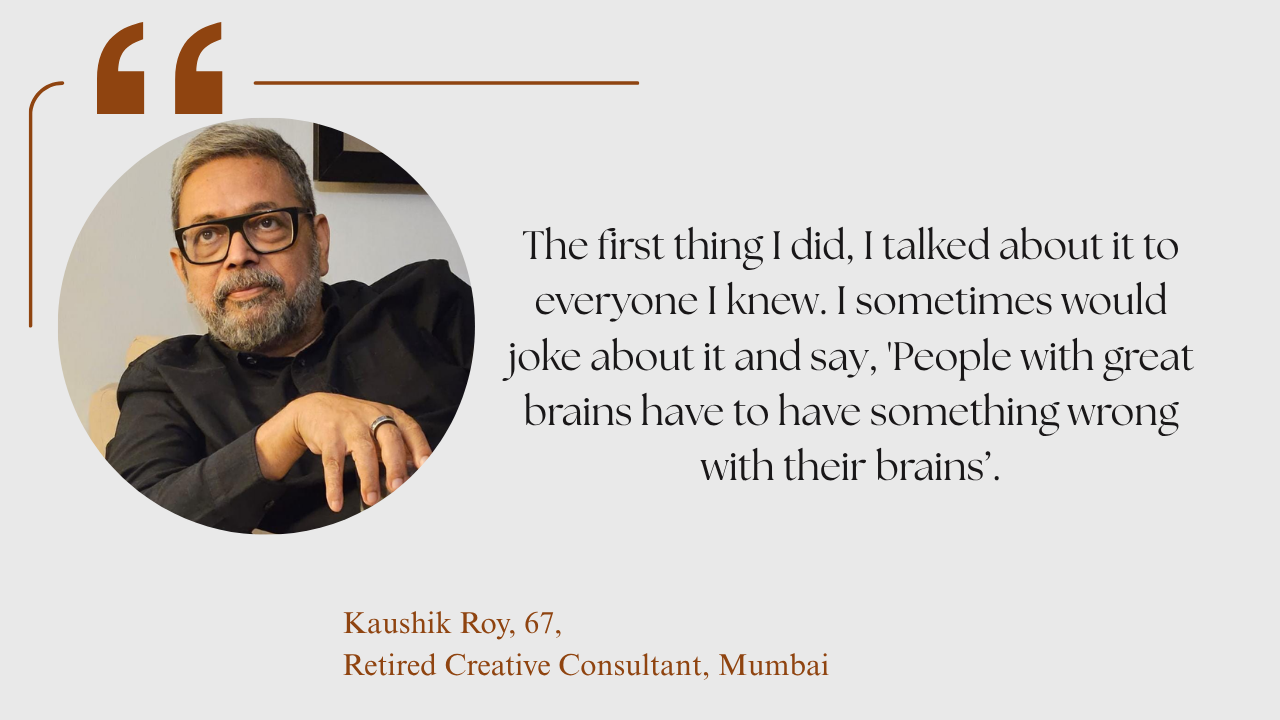
Kaushik Roy, 67, from Mumbai, a retired creative consultant with Reliance Group, was diagnosed with a tumor in the right side of his brain in 2022.
This was also the time when the world was slowly opening up after two years of the COVID-19 pandemic. Things were still slow and dull , and people were still lethargic. So, inactivity and depression as symptoms of a brain tumor did not really ring a bell to Kaushik.
"There were symptoms, but they were so subtle that you would not notice them. In fact, my wife was also not able to tell . It was my son who noticed those symptoms. He saw the small changes in me, including my facial expression, or that I would get irritated with the things that usually would not bother me," he shares.
One thing that he felt within himself was the loss of balance. However, all such symptoms are also signs of aging, which he jokingly said as the first thing as he spoke about his cancer journey. "I am now a senior citizen..."
Thanks to his son, he did a brain scan, which detected some abnormalities in the brain. Kaushik was then prescribed an MRI and was asked to meet a neurologist. Glioma was detected, and within a week's time it was operated on.
After his surgery and spending two nights in the ICU, he was told to do things that he normally would have. So, for Kaushik, the normal life was to get on his laptop and work through the night. This is what he did. "But this concerned my wife, who thought I should not be taxing my brain after a brain surgery," he says.
It was not until very late when Kaushik realized that what he went through was a kind of cancer that "does not have a great success rate". "So, the first thing I did, I talked about it to everyone I knew. I sometimes would joke about it and say, 'People with great brains have to have something wrong with their brains'."
Talking to people, for Kaushik, helped him in his journey. "I talked about it to everyone I knew. When you tell someone about something as serious as cancer, they might tell you that they know a doctor from whom you can get a second opinion. Some, in fact suggested that I worship a certain god or perform certain rituals. Most of it I did not do or follow . However, I knew that these are were said in as good wishes, which helped me in more ways than I can think of. I accepted all that people said to me. It was their way of caring for me, showing their love and affection and keeping me in their prayers," he says.
For him, another thing that helped him face this fear was to confront the reality. He says that he did spiral at the question of 'Why Me?' when it hit him what had actually happened. However, "when you start looking at death as real, you become not so fearful. You do not see death as a villain, but see it as a reality, which needs to be embraced," he says.
Even when he lost his sense of taste or smell, or was told to not drink alcohol, he did not let it cripple him self . "I can still hold a glass of soda and feel included in a social gathering. I for a very long time have not been consuming sugar. When you lead a healthy life from a young age, you do not feel the need to curb things as you grow older."
This attitude also helped him live in reality, in the present. He returned to doing the things he loved the most, which also included his passion for art and literature. He was now more mindful of his actions. However, he points out that cancer never really goes away.
He now has to get a medical examination done every six months to ensure that he is cancer-free. For him, it is like an "examination no one can prepare him for". However, he does not let it become a hurdle. He calls it a "race without a finishing line."
ALSO READ: Meet Premlata Sand, The Woman Who Defeated Cancer Twice At 63
“I Froze. I Went Blank. It Was An Emotional Turmoil I Can’t Describe.”
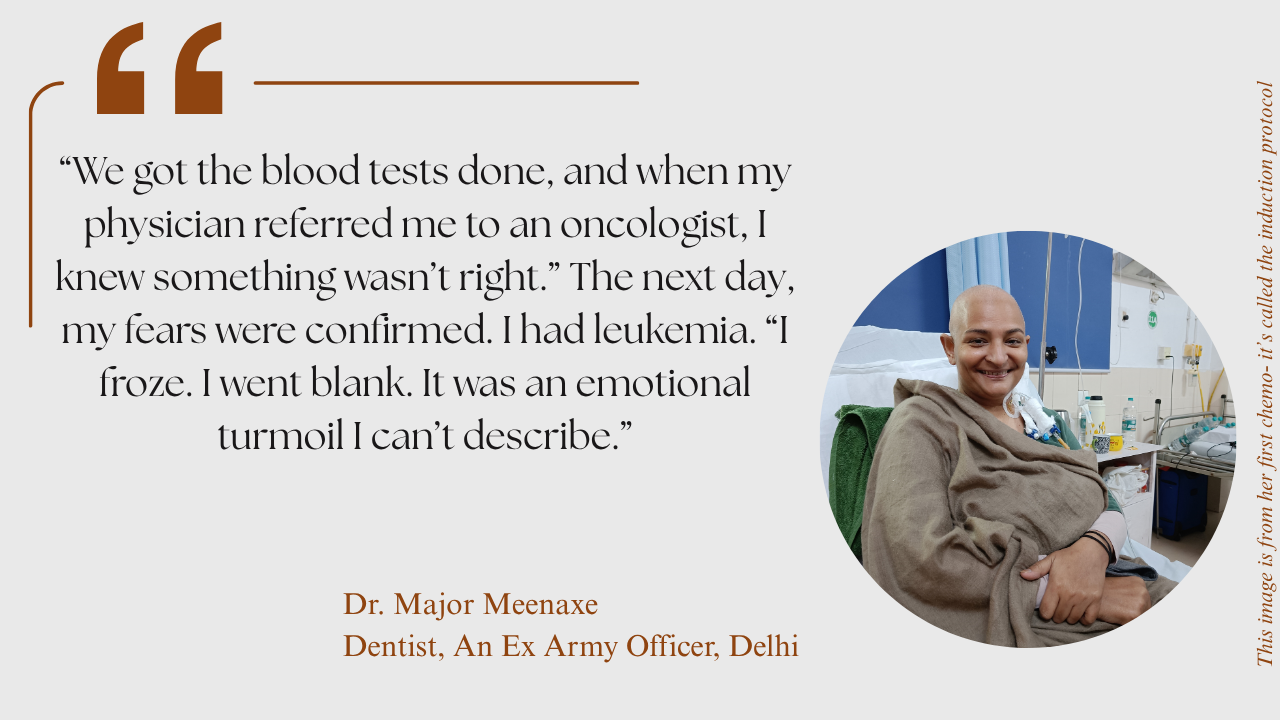
When the diagnosis comes, it doesn’t knock gently. It barges in—loud, disorienting, and unforgiving. For Dr. Major Meenaxe is a dentist, an ex Army officer, a mother, and a cancer survivor. In December 2021, her life took an unexpected turn when she was diagnosed with Mixed Phenotype Acute Leukemia, a rare and aggressive form of blood cancer with no clear treatment path.
“I thought it was viral,” she recalls. “Just a routine fever. We got the blood tests done, and when my physician referred me to an oncologist, I knew something wasn’t right.” The next day, her fears were confirmed. She had leukemia. “I froze. I went blank. It was an emotional turmoil I can’t describe.”
Major Meenaxe entered what she now describes as a “storm of emotions.” Denial set in first. Anger and profound sadness followed like waves. “I remember thinking—why me? I had always been healthy, strong, independent. And now, suddenly, I needed help to hold a glass of water.”
But amid the turbulence, she found stillness. It wasn’t immediate. It came with time—and an enormous reserve of patience. “Slowly, I learned to stay calm. I realized that this wasn’t going to be over quickly. It was a long journey, and I had to be in it fully, emotionally and spiritually.”
As days stretched into weeks, Gunjan faced more than just the rigors of chemotherapy. She contracted COVID twice. She had surgery. She experienced a relapse just two months after chemo. Meenaxe's voice reassuring me of the pain she went through in that minute, “It was brutal. The ‘what ifs’ never stopped. There were moments I couldn’t see beyond the pain or the mental blockages.”
“I would sit quietly. I knew nothing was in my hands. That’s when I turned to faith—faith in God, in my daughters, in my mother. They were with me, every step.”
Major's eldest daughter stepped into the role of caretaker with grace and strength beyond her years. She add, “She looked at me and said, ‘Think of this as a God-sent vacation. I’ll be your mom. Just rest.’ That changed everything.”
Her hospital room echoed with retro Bollywood songs—her comfort soundtrack during chemo. And once the bone marrow transplant was over, she turned to zentangle art and crochet. “They calmed me. They helped with the post-chemo side effects. It wasn’t just about surviving anymore—it was about finding peace.”
Every day began and ended with a single line- “Every day, in every way, I’m getting better and better.”
Whether at 4:00 a.m. during blood draws or when insomnia loomed late at night, this mantra became her internal rhythm—a soft rebellion against the chaos of illness.
For someone who had served in the army, losing physical independence was especially difficult, “I couldn’t drive. That was hard. I’ve always been self-reliant.” But eight months after her transplant, she got behind the wheel again—this time, in her brand-new car, driving it home from the showroom.
“That was my first normal moment. That was the real comeback.”
Through it all, Major Meenaxe never felt alone, “There were tears, of course. But we held the fort together. My family, my friends—they never left. They sat with me in the pain and the silence. That presence… that’s what kept me going.”
For Dr. Major Meenaxe, surviving cancer wasn’t the end of a battle—it was the beginning of a transformation. She’s no longer just a patient or a fighter. She’s a reclaimer of joy, a believer in faith, and a woman who, even in her darkest moments, whispered to herself—“I am getting better and better.”
READ MORE: Fact Check: Can Ivermectin Really Treat Cancer?
“I Told Myself I Had To Be Strong. I Had To Do This Not Just For Me But For My Kids."
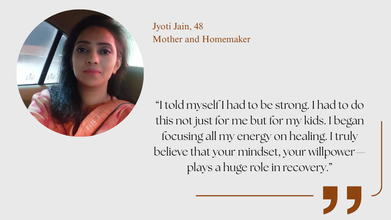
Jyoti’s voice, calm and composed today, carries the weight of her past uncertainty. Speaking from her home in India, now 48, she vividly remembers the shock of hearing the words “breast cancer.” Like many young mothers, her first thoughts weren’t about herself—but her children.
When Jyoti Jain was diagnosed with breast cancer at the age of 33, she wasn’t just facing a disease—she was confronting a life-altering shift in everything she thought she knew. Her children were still young, her life full of the simple busyness of motherhood and daily routines. But that ordinary world was upended in an instant. Jyoti said, “It felt like life suddenly hit pause,” she recalls. “I kept asking myself—how did this happen to me?”
“Everything felt suspended. I didn’t know if I would make it. I didn’t know if I would get to raise my kids,” she says. “At that time, they were so small. All I could think about was what would happen to them if I wasn’t around.”
She began her treatment at Rajiv Gandhi Cancer Institute, a name familiar to many in India for its high-volume cancer care. But what helped shift her perspective wasn’t just medicine—it was the community of survivors around her. “At the hospital, I saw people in far worse situations than mine, yet they were smiling, fighting, surviving. That gave me hope.”
There were nights of fear, moments when the mirror reflected a body she no longer recognized. Times when fatigue whispered louder than hope. And yet, what carried her through was something invisible—her willpower.
“I told myself I had to be strong. I had to do this not just for me but for my kids. I began focusing all my energy on healing. I truly believe that your mindset—your willpower—plays a huge role in recovery.”
The emotional toll of cancer often lingers in silence, but Jyoti was not alone. Her children, family, and her determination to not let cancer define her became her shield. When treatment ended, something else began—the slow process of rediscovering herself.
“Once I got better, I immersed myself in my family, my home, my everyday routines. I would take long evening walks, spend time outdoors, and just stay busy.”
That decision—to reclaim joy—was intentional. Jyoti refused to let her mind spiral into fear again. In keeping herself mentally and physically engaged, she found her version of healing.
Today, as a cancer survivor who has lived nearly 15 years cancer-free, Jyoti’s message is simple but powerful, “No matter what disease you are battling, please fight it with positivity. Your mindset, your willpower—they matter so much. If your will is strong, you can overcome even the toughest diagnosis.”
"Doctors Told Me, ‘Keep Living Your Life, Don’t Stop Working, Don’t Stop Enjoying.’ And I Followed That Advice Exactly.
There are journeys in life that break you and then, there are journeys that build you—quietly, fiercely, and with unimaginable grace. Diagnosed in 2021, a year still blurred by pandemic fatigue, political shifts, and personal loss for many. For Neha (name changed for anonymity), that year brought an uninvited guest- cancer. Neha said, “The moment I got to know, it turned me numb but somehow, there was no fear. There was just stillness and an unshakable faith in the Divine.”
In the initial hours following her diagnosis, there was no spiraling, no frantic rush of dread. What arrived instead was calm—a calm that Neha attributes to something bigger than herself.
“Thanks to the Divine, I had no fear of losing my life. I didn’t feel anxiety. Yes, the pain was real. Physically, it was incredibly difficult but emotionally, I was in a happy space.”
This emotional equilibrium, Neha says, came from spiritual strength and a mindset rooted in acceptance and trust.
Her care team played a pivotal role, alongside her family and friends, her doctors became a community of belief. They offered her not just treatment, but perspective. Neha shares, “They told me, ‘Keep living your life, don’t stop working, don’t stop enjoying.’ And I followed that advice exactly. I kept my lifestyle as close to normal as possible.”
That guidance—simple yet profound—allowed her to carry on. She stayed engaged in what she loved, keeping her mind active and her spirit focused on recovery, not loss.
For her, healing came not just through chemotherapy or scans, but through divine companionship. She describes the experience as “walking through fire while the Divine held me tight.”
“It was a spiritual awakening. I became more loving, more compassionate. I believe that challenges come into our lives to help us grow—emotionally, spiritually, and humanely.”
The year-and-a-half journey through treatment became, in her words, “an experience I actually enjoyed”—not for the pain, but for the people, the presence, and the profound inner transformation.
Today, she lives with a renewed sense of purpose. Not merely a survivor, she is a seeker, a giver, and a gentle reminder that sometimes, the strongest souls are those who walk quietly with pain—and still smile. Neha says rather estatically, “If you ask me what cancer gave me—it brought me closer to the Divine. It made me more human. More alive.”
CHECK OUT THIS: I Survived- ‘It Began With A Lump And Some Discolouration Of My Skin’: Story Of A Woman Fighting And Living With Breast Cancer
I Didn’t Know What Would Happen. I Was Scared, Angry, Helpless—All At Once.”
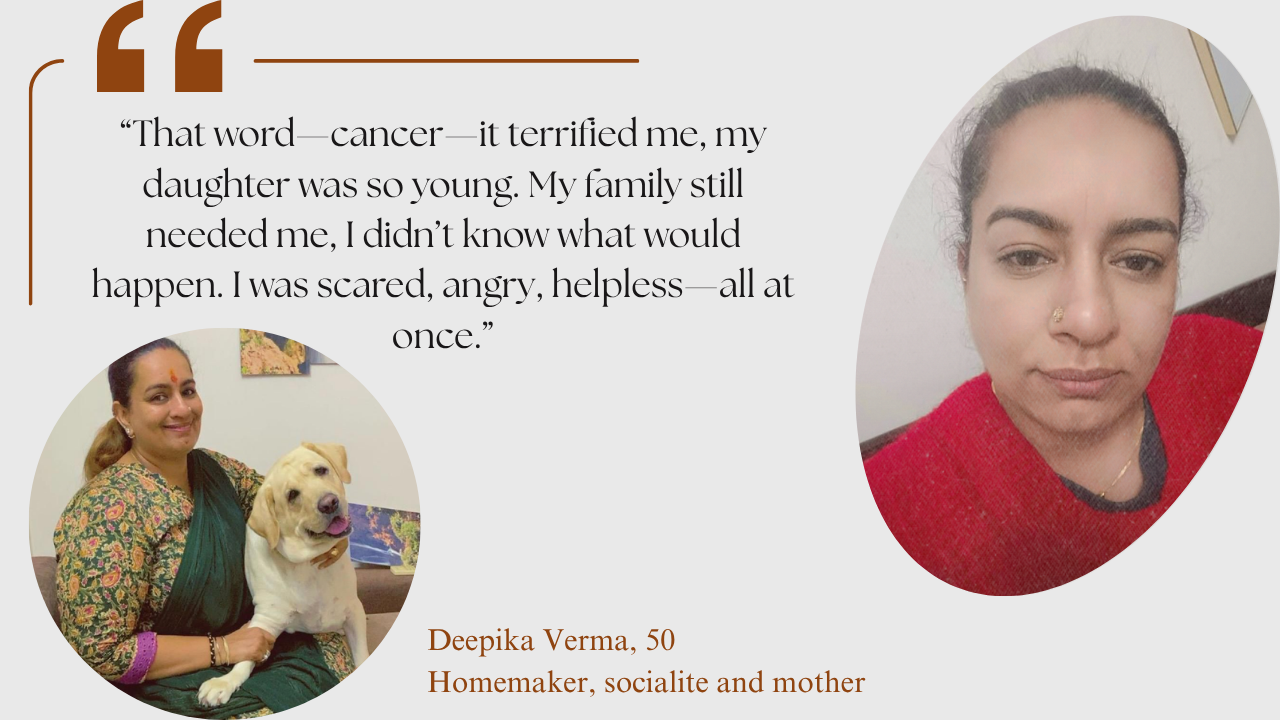
When Deepika Verma speaks about her battle with breast cancer, her voice carries the strength of someone who didn’t just fight cancer—she outlived it with grace, pain, fear, and a deep reservoir of love. "I was in my early fifties and life was normal—busy raising my daughter Sonal and supporting my husband," Deepika recalls. “It must have been 2016 or 2017, I can't remember exactly but I remember how ordinary everything seemed until my mammogram.”
Within days of the scan, Deepika was diagnosed with breast cancer. “My husband had to fly abroad for work, but the minute we got the news, he cancelled everything. He said, ‘I’m not leaving. You’re not going through this alone.’”
The gravity of the diagnosis hit hard. “That word—cancer—it terrified me, my daughter was so young. My family still needed me, I didn’t know what would happen. I was scared, angry, helpless—all at once.”
In the days following her diagnosis, Deepika found herself in a mental fog. “Nothing made sense. There were nights I just stared into the dark, asking, ‘Why me?’”
Chemotherapy was a turning point and not in the way one might imagine. “It broke me,” she admits. “I would be unconscious almost the entire day after every session. I had nausea, weakness, and a kind of emptiness that felt bottomless.”
There were weeks when she couldn’t keep food down. Days when the fatigue was so overwhelming, she didn’t have the energy to talk. With a sobering voice Deepika explains, “I felt like I was losing parts of myself not just my health, but my identity.”
When asked what helped her hold on, Deepika doesn’t hesitate. “Faith in God, my Guruji’s blessings, and my family.”
Her daughter, still just a child at the time, became her emotional anchor. “She did things a much older child would do—stood by me, comforted me, brought me water when I couldn’t lift my head. She was my courage.”
Her husband, equally devoted, made symbolic gestures that meant the world to her. “When my hair started falling out after a couple of chemo rounds, I was devastated. I loved my hair, I cried so much! So my husband and daughter blacked out all the mirrors in the house so I wouldn’t see myself like that.”
He also bought her a wig—curly, beautiful and expensive, Deepika adds smiling, “It was exactly what I liked. I didn’t wear it often, but just knowing he did that—it gave me strength.”
When asked if she had a mantra or quote that kept her grounded, Deepika says, “Yes, ‘Himmat mat harna.’"- Never lose courage.
That mantra wasn’t just for her. “It’s what I tell every cancer warrior now. If your family supports you, and you keep your faith strong, you will get through it. Just don’t give up.”
Cancer, she says, is a lonely journey—even with people around. “There were days I felt like no one truly understood what was happening inside me. I was surrounded by love, but it still felt isolating.”
Yet in that solitude, she found clarity. “It made me reflect deeply. It made me appreciate every moment—even the painful ones. Especially the painful ones.”
After treatment, Deepika slowly began reclaiming her life. “I remember the first time I went outside on my own. Just to the grocery store. It was such a normal thing, but I felt alive—free.” She still gets routine PET scans—once a year now instead of twice. “I’m cautious, but I don’t live in fear anymore. I live in gratitude.”
“Cancer will change your life but it will also show you the depth of your strength, the power of your loved ones, and the beauty of every ordinary day. Don’t lose hope, hold on and keep going.”
READ: Soha Ali Khan Talks About Sharmila Tagore's Zero Stage Lung Cancer Diagnosis: Know What It Means
“I Remember Crying Like A Child When A Relative Said They Were Busy. That Pain That Loneliness I Will Never Forget.”
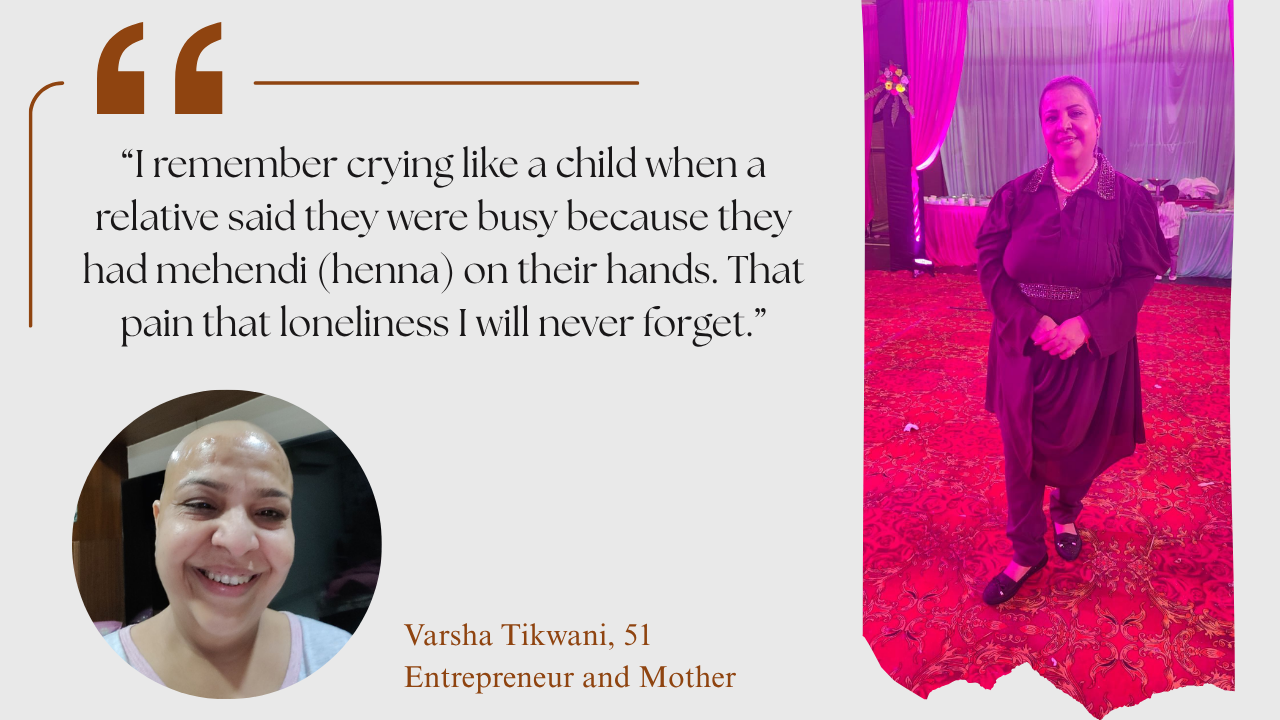
For Varsha Tikwani, a 51-year-old entrepreneur and mother, life before cancer was about routine check-ups and quiet worry. A small lump in her right breast—no larger than a mustard seed—had been detected over 15 years ago. Doctors had initially assured her it was benign and simply required monitoring every six months. And so, like many women juggling family and work, she carried on, placing her trust in the slow rhythm of mammograms and ultrasounds.
Then came COVID-19, the pandemic not only paused the world but silenced many inner alarms. “Somewhere in my gut, I felt that the lump wasn’t right anymore,” Varsha recalls. But hospitals were overrun, and stepping out was no longer safe. Two years slipped away. And when life finally began to crawl back to normal, Varsha found the lump had ballooned to the size of a tennis ball. “That day, when I felt it under my hand, I froze. I showed my daughter, and she looked at me and said—‘Mom, this doesn’t look right.’”
Life, however, wasn’t offering her any relief. Their family business had taken a hit during the pandemic. “I was still processing financial loss when this health scare hit. Honestly, I kept putting it off,” she says. But fate had other plans when a bout of intense abdominal pain from a suspected kidney stone forced her to visit the hospital. Her husband insisted she undergo a complete ultrasound. That’s when Varsha, almost casually, asked, “Should I get a mammogram done too? It’s been two years.”
What followed was a whirlwind—radiologists whispering, gynecologists urging immediate consultations, and oncology appointments that couldn’t wait. “I remember sitting alone in the waiting room, unsure of how to tell my husband. He was already burdened, I didn’t want to break him,” she says, her voice faltering. She made frantic calls to relatives, searching for someone—anyone—who could sit beside her but life, in its strange way, had everyone tied up. “I remember crying like a child when a relative said they were busy because they had mehendi (henna) on their hands. That pain that loneliness I will never forget.”
Yet amidst the chaos, something miraculous happened. A kind woman sitting nearby sensed her distress and accompanied her inside the doctor’s cabin. “She was a stranger but she held my hand and she gave me strength,” Varsha recalls, her voice thick with emotion. When her nephew finally arrived, she had already decided—she would fight. “I told myself—‘If I let fear win, I lose everything. So I must choose courage.’”
Diagnosis confirmed her deepest fear—it was breast cancer. The emotional weight of that word was indescribable. “It wasn’t just about dying. It was about leaving my children, not seeing their future, not holding my husband’s hand through old age.” Instead of spiraling into despair, Varsha turned inward. Her strength came from prayer, from a quiet but firm belief that God walks beside those who refuse to give up.
There were moments of anger, yes with moments of grief but she allowed herself to feel each emotion. “Suppressing doesn’t help. I cried when I needed to, screamed into pillows, and wrote letters I never sent,” she admits. Her therapy came through her daily rituals—morning prayers, small moments of gratitude, cooking simple meals when she could, and tending to her garden. “Each blooming flower reminded me that life goes on.”
She adopted a mantra that kept her grounded, “This too shall pass”, and when days got dark, she reminded herself that healing wasn’t linear. “Some days, you win. Some days, you rest. But every day, you try.”
The first time Varsha truly felt “normal” again was when she walked into her kitchen and made chai from scratch. “The smell of cardamom, the sound of the bubbling milk—it brought me home to myself,” she says, smiling.
Today, as a proud cancer survivor, Varsha carries her story like a badge of honor. Not to relive the pain, but to show others that healing is not just medical—it’s emotional, spiritual, and deeply human. “I didn’t just survive cancer. I came back to life,” she says.
READ ON: Tahira Kashyap's Cancer Relapsed: Why Do Some Cancers Return?
Not Just Remission, But Also Reclaiming Life
On this National Cancer Survivors Day, we honor the courage it takes not just to fight cancer—but to live after it. Through every raw emotion, each moment of fear, denial, or grief, survivors have shown us that healing is rarely linear, but always deeply personal. The voices in this story echo a powerful truth: cancer may alter the body, but it also awakens the spirit.
These journeys are not defined by statistics or scan results, but by the strength it took to wake up on difficult days, the faith held in small rituals, and the moments when joy slowly returned often quietly, in the form of a laugh, a walk, a hug. Survivorship isn’t just about remission—it’s about reclaiming life, piece by piece.
Each story shared is a reminder that while the diagnosis may begin with fear, the road forward can hold resilience, meaning, and connection. Today, we don’t just applaud those who’ve made it through—we listen to them, we learn from them.
Read More On Cancer Here
© 2024 Bennett, Coleman & Company Limited

